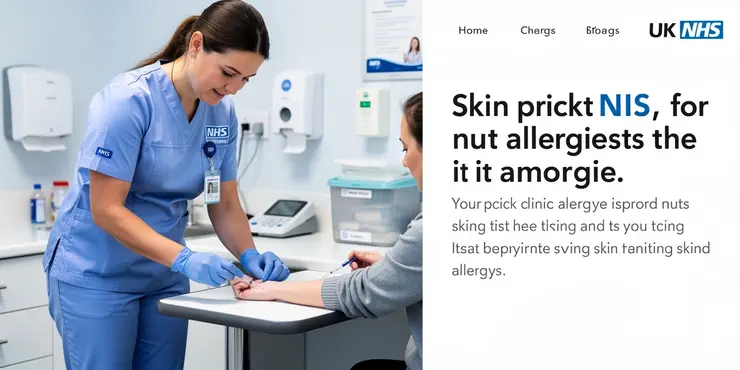
Find Help
More Items From Ergsy search
-

What are Nut Allergies?
Relevance: 100%
-

Is there a cure for nut allergies?
Relevance: 99%
-

Are nut oils safe for people with nut allergies?
Relevance: 96%
-

Can nut allergies be outgrown?
Relevance: 96%
-

How is a nut allergy diagnosed?
Relevance: 94%
-

What are the symptoms of a nut allergy?
Relevance: 94%
-

How can nut allergies be managed?
Relevance: 91%
-

What types of nuts can cause allergies?
Relevance: 89%
-

Can nut allergies develop later in life?
Relevance: 89%
-

What is the difference between a nut allergy and intolerance?
Relevance: 89%
-

What should I do if I think I have a nut allergy?
Relevance: 86%
-

Is epinephrine the only treatment for severe nut allergy reactions?
Relevance: 80%
-

What should I tell my family and friends about my nut allergy?
Relevance: 76%
-

Can tree nuts and peanuts cause cross-reactions?
Relevance: 66%
-

Is it safe to eat foods labeled as 'may contain nuts'?
Relevance: 63%
-

What foods should I avoid if I have a nut allergy?
Relevance: 62%
-
How can I prevent cross-contamination with nuts in the kitchen?
Relevance: 62%
-

Are there any recent treatments or research developments for nut allergies?
Relevance: 62%
-

What are Dairy Allergies?
Relevance: 47%
-

Dealing with Seasonal Allergies
Relevance: 46%
-

How are food allergies managed in UK schools?
Relevance: 44%
-

Can I get the COVID jab if I have allergies?
Relevance: 41%
-

Can children with nut allergies safely attend school?
Relevance: 40%
-

What if I have an egg allergy, can I still get the flu vaccine?
Relevance: 38%
-

Can patients with drug allergies still take heart disease medications?
Relevance: 38%
-

How are special dietary requirements catered for in school meals?
Relevance: 28%
-

What foods can trigger nettle rash?
Relevance: 27%
-
Can orange juice be allergenic?
Relevance: 26%
-

Can diet affect eczema?
Relevance: 21%
-

Is it possible to be allergic to the sun?
Relevance: 20%
-

What is anaphylaxis?
Relevance: 20%
-

Do pets contribute to hay fever?
Relevance: 19%
-

How can I prevent eczema flare-ups?
Relevance: 19%
-

How can I reduce my exposure to pollen?
Relevance: 18%
-

Nettle rash
Relevance: 17%
-

What happens if I have special dietary needs?
Relevance: 17%
-
What types of fats are healthy to consume?
Relevance: 17%
-

What foods are high in fiber?
Relevance: 16%
-
Can I meet my fat requirements from plant-based sources?
Relevance: 16%
-
Are there specific fats that support heart health?
Relevance: 16%
Introduction to Nut Allergies
Nut allergies are among the most common food allergies and can provoke severe allergic reactions. In the UK, nut allergies are a significant concern, especially for children. This guide outlines the types of nuts that commonly cause allergies and offers insight into managing these allergies effectively.
Common Tree Nut Allergies
Tree nuts are one of the primary categories where allergens are found. These include almonds, Brazil nuts, cashews, hazelnuts, macadamia nuts, pecans, pine nuts, pistachios, and walnuts. Tree nut allergies are often lifelong and can result in severe reactions, including anaphylaxis.
Peanut Allergies
Peanuts, while technically legumes and not tree nuts, are often grouped together with tree nuts due to the similarity in reactions they provoke. Peanut allergies are prevalent and can also result in life-threatening responses. Symptoms can include hives, digestive problems, and respiratory issues.
Lesser-Known Nut Allergies
Though less common, allergic reactions can occur with other nuts. These include chestnuts, often used in cooking around Christmas in the UK, and pine nuts, which are used in pesto and various regional dishes. Awareness of these lesser-known nut allergens is essential when managing or diagnosing nut allergies.
Cross-Reactivity and Nut Allergies
Cross-reactivity is a crucial aspect of nut allergies. Individuals allergic to one type of tree nut might react to others. Additionally, those allergic to peanuts may also show sensitivities to other legumes like lentils or soybeans. It’s important to have each allergy properly diagnosed to understand specific triggers.
Diagnosing Nut Allergies
Diagnosis generally involves a combination of patient history, skin prick tests, and blood tests to confirm specific IgE levels related to nut allergens. Once diagnosed, strict avoidance of the confirmed nuts is necessary, alongside carrying emergency medication like antihistamines and epinephrine auto-injectors.
Management and Precautions
For individuals with nut allergies, management involves vigilant avoidance of the allergenic nuts. This includes reading labels carefully, understanding cross-contamination risks in kitchens, and being aware of potential hidden sources in foods. Dining out requires communicating the allergy clearly to restaurant staff.
Conclusion
Understanding the types of nuts that can cause allergies is vital for effective management and preventing reactions. The most common offenders in the UK include almonds, walnuts, and peanuts, but awareness of all potential allergen sources is necessary. Consultation with healthcare professionals for a tailored allergy action plan is recommended for affected individuals.
Introduction to Nut Allergies
Some people are allergic to nuts. This means nuts can make them very sick. In the UK, many kids have nut allergies. This guide helps you learn which nuts cause allergies and how to stay safe.
Common Tree Nut Allergies
Tree nuts can make people with allergies very sick. Examples are almonds, Brazil nuts, cashews, hazelnuts, macadamia nuts, pecans, pine nuts, pistachios, and walnuts. People with these allergies often have them for life. Sometimes, the reaction can be very serious and require emergency care.
Peanut Allergies
Peanuts are not actually tree nuts, but they can also make people very sick. Many people have peanut allergies. If someone eats peanuts and they have an allergy, they might get hives, tummy aches, or trouble breathing.
Lesser-Known Nut Allergies
Some people are allergic to nuts that are not as common. These nuts include chestnuts and pine nuts. Chestnuts are used in holiday cooking, and pine nuts are used in pesto. It is important to know about these allergies too, especially if someone is allergic to other nuts.
Cross-Reactivity and Nut Allergies
Sometimes, if you are allergic to one nut, you might be allergic to another. This is called cross-reactivity. If you are allergic to peanuts, you might have problems with foods like lentils or soybeans too. It is important to find out exactly what you are allergic to by seeing a doctor.
Diagnosing Nut Allergies
Doctors can find out if someone has a nut allergy by asking questions, doing skin tests, or using blood tests. If you have an allergy, you must stay away from those nuts. You should also carry medicine like antihistamines and an epinephrine pen in case of emergency.
Management and Precautions
If you have a nut allergy, you need to be very careful. Always check food labels to see what is inside. Be careful about kitchen tools that might have touched nuts. When you eat at a restaurant, tell the staff about your allergy to keep safe.
Conclusion
Knowing which nuts can make you sick is important to stay safe. The most common nuts that cause problems in the UK are almonds, walnuts, and peanuts. It is important to know all the nuts that can be a problem. Visit a doctor to make a safe plan for dealing with allergies.
Frequently Asked Questions
What are the most common nuts that cause allergies?
The most common nuts that cause allergies are peanuts, tree nuts such as almonds, walnuts, cashews, hazelnuts, pistachios, Brazil nuts, and pecans.
Can eating peanuts cause allergies?
Yes, peanuts are one of the most common allergens and can cause severe allergic reactions in sensitive individuals.
Are tree nut allergies the same as peanut allergies?
No, tree nut allergies and peanut allergies are different, but some people may be allergic to both. Peanuts are legumes, while tree nuts come from different plant families.
Can someone be allergic to only one type of tree nut?
Yes, it's possible to be allergic to only one type of tree nut, although some people may be allergic to multiple types.
What symptoms might indicate a nut allergy?
Symptoms of a nut allergy can include hives, swelling, difficulty breathing, wheezing, stomach pain, diarrhea, and in severe cases, anaphylaxis.
Are coconut and nutmeg considered nuts in terms of allergy?
Coconut is classified as a fruit, not a nut, and nutmeg is a seed. However, some individuals with tree nut allergies may also react to these.
Can nut allergies develop later in life?
Yes, while most nut allergies develop in childhood, they can also occur in adulthood.
Is it safe to eat nuts if I have a mild nut allergy?
If you suspect a nut allergy, even if mild, it is important to consult with an allergist before consuming nuts.
Are there treatments available for nut allergies?
Avoidance of nuts is the primary treatment. In some cases, oral immunotherapy may be considered under medical supervision.
Can nut allergies be outgrown?
Some children may outgrow their nut allergies, but many individuals have them for life. Regular evaluations by an allergist are recommended.
How is a nut allergy diagnosed?
Nut allergies are typically diagnosed with skin prick tests, blood tests for specific antibodies, and sometimes oral food challenges.
How can I manage a nut allergy?
Management involves avoiding nuts and products containing nuts, reading labels, and carrying emergency medications like antihistamines and epinephrine.
What should I do if I accidentally consume nuts?
If exposure occurs, follow your allergy action plan, which may include taking antihistamines and using an epinephrine injector, and seek immediate medical attention.
Can people with nut allergies eat food cooked in peanut oil?
Highly refined peanut oil is usually safe for people with peanut allergies, but cold-pressed, expelled, or extruded peanut oils should be avoided.
Are seeds safe for people with nut allergies?
Many seeds, such as sunflower and pumpkin seeds, are safe, but cross-reactivity or individual sensitivities can occur, so caution is advised.
Is it necessary to avoid all products labeled 'may contain nuts'?
It is recommended, especially for those with severe allergies, as cross-contamination could occur during processing.
What alternative food options are available for people with nut allergies?
People with nut allergies can consume seeds like sunflower, pumpkin, and chia seeds, as well as soy and other legumes, if they are not allergic to them.
Can nut allergies be prevented?
Introducing nuts early in a child's diet, as per recent guidelines, may lower the risk of developing allergies, but always consult a healthcare provider first.
How can one avoid cross-contact with nuts?
Use separate utensils and cooking surfaces, thoroughly clean dishes, and be cautious with bulk bins and bakeries where cross-contact is more likely.
Is it safe for someone with a nut allergy to fly on an airplane?
While airlines have different policies, most allow passengers to notify them of allergies so they can take precautions like refraining from serving nuts.
Which nuts often cause allergies?
The nuts that often make people sick with allergies are peanuts and tree nuts. Tree nuts include almonds, walnuts, cashews, hazelnuts, pistachios, Brazil nuts, and pecans.
Can peanuts make you sick?
Some people can get sick from eating peanuts. This is called an allergy. It can make you feel itchy or make it hard to breathe.
It's important to be careful. If you think peanuts might make you sick, talk to a grown-up or a doctor.
You can use tools like picture charts or ask someone to read to you if you need help understanding.
Yes, peanuts can make people very sick if they are allergic. Some people get sick very quickly when they eat peanuts.
Are tree nut allergies the same as peanut allergies?
Tree nuts and peanuts are different. Tree nuts grow on trees. Peanuts grow underground. If you are allergic to one, you might not be allergic to the other. Always check with a doctor. Try using pictures or videos to learn more.
No, being allergic to tree nuts is not the same as being allergic to peanuts. But some people can be allergic to both. Peanuts are a type of bean, not a nut. Tree nuts come from different kinds of plants.
Here are some helpful tips:
- Make a list of nuts and peanuts to avoid.
- Use pictures to identify safe and unsafe foods.
- Ask an adult for help when reading food labels.
Can you be allergic to just one kind of tree nut?
Yes, some people can be allergic to only one kind of tree nut. Not everyone is allergic to all tree nuts. If you think you might be allergic, ask a doctor for help.
Here are some helpful tips:
- Always read food labels to look for nuts.
- Ask an adult to help you if you are not sure what's safe to eat.
- Keep a list of the nuts you need to stay away from.
Yes, you can be allergic to just one kind of tree nut. Some people are allergic to more than one kind.
How can you tell if someone is allergic to nuts?
If someone has a nut allergy, they might feel sick or get itchy skin. They could also have a tummy ache or find it hard to breathe. Sometimes, their lips or face might swell up.
If you think someone is allergic to nuts, it's good to tell an adult or a doctor. They can help keep the person safe.
If you are allergic to nuts, you might get itchy spots, swelling, trouble breathing, a whistling sound when breathing, tummy ache, runny poop, and in very serious cases, a big allergic reaction called anaphylaxis.
Are Coconut and Nutmeg Nuts for People with Allergies?
If you are allergic to nuts, you might wonder if coconut or nutmeg are nuts. Here is how to understand them:
Coconut: Coconut is not a nut. It is a fruit. Most people with nut allergies can eat coconut, but it's a good idea to ask a doctor first.
Nutmeg: Nutmeg is also not a nut. It is a spice from seeds. People with nut allergies usually do not have problems with nutmeg.
If you are worried, talk to a doctor. You can also use apps or pictures to help understand allergies better.
Coconut is a type of fruit. It is not a nut. Nutmeg is a seed. But some people who are allergic to nuts might also be allergic to coconut or nutmeg.
Can you get a nut allergy when you are older?
Yes, it is possible to get a nut allergy when you are older. Some people are not allergic to nuts when they are young, but they can become allergic later.
Tools and tips to help:
- Use simple words and sentences.
- Ask someone to help read and explain.
- Look for pictures or videos about nut allergies.
Yes, people usually get nut allergies when they are kids. But sometimes, grown-ups can get them too.
Can I eat nuts if I have a small nut allergy?
If you have a nut allergy, even a small one, it is better to be careful. Eating nuts might make you feel unwell or cause a reaction.
Here are some things you can do:
- Ask a doctor for advice.
- Read food labels to check for nuts.
- Try alternatives like seeds if you can't eat nuts.
It's important to stay safe and avoid foods that may cause an allergy problem.
If you think you might be allergic to nuts, it is important to talk to a doctor who knows a lot about allergies before eating nuts.
Can nut allergies be treated?
Yes, there are ways to help people with nut allergies.
If you have a nut allergy, see a doctor. They can help you with the best plan.
Here are some things that might help:
- Tell others you have a nut allergy.
- Avoid eating foods with nuts.
- Read food labels carefully to check for nuts.
- Have medicine like an EpiPen ready in case you come in contact with nuts.
It might also help to learn more about nut allergies. Parents, teachers, and friends can help you too.
The main way to stay safe is to not eat nuts. Sometimes, doctors might try a special treatment. This treatment lets you eat small amounts of nuts while a doctor watches closely to make sure it's safe.
Can kids stop being allergic to nuts?
Some kids who are allergic to nuts can stop being allergic as they get older. This doesn't happen to everyone. It's important to talk to a doctor. The doctor can do tests to see if the allergy is gone.
Helpful tools: Drawing pictures, using simple stories, and having a grown-up help explain can be useful.
Some kids might stop being allergic to nuts as they grow up, but a lot of people have nut allergies their whole life. It is a good idea to see a special doctor called an allergist to check on the allergy regularly.
How do doctors find out if you have a nut allergy?
Doctors find out if someone is allergic to nuts in a few ways. They might do a little skin test, look at the blood for special signs, or sometimes give small amounts of the food to see what happens.
How can I take care of myself if I am allergic to nuts?
If you have a nut allergy, here are some easy steps to stay safe:
- Do not eat any nuts or foods with nuts.
- Always read food labels to check for nuts.
- Tell your friends and family about your allergy.
- Carry special medicine called an EpiPen in case of emergencies.
- Wear a medical alert bracelet that says you have a nut allergy.
- Ask questions if you are unsure about what is in your food.
Here are some tools and tips to help you:
- Use a phone app to remind you to check food labels.
- Practice using your EpiPen with a trainer pen.
Always be careful and ask for help if you need it. Stay safe!
If you have a nut allergy, here’s how to stay safe:
- Don’t eat nuts or foods with nuts. Be very careful.
- Read the labels on food packages. Check if they have nuts.
- Always have your medicine with you. This includes pills for allergies and a special medicine called an epi-pen for emergencies.
What if I eat nuts by mistake?
If you eat nuts by mistake, here are some steps you can take:
- Stay calm.
- If you feel okay, drink some water.
- If you feel sick or itchy, tell someone you trust.
- If you have medicine for allergies, you might need to take it.
- If you have trouble breathing, call for help right away.
It can help to keep a list of foods you need to avoid. You might also like to use a tool like a food diary to track what you eat.
If you have an allergy and come into contact with something that makes you sick, follow these steps:
1. Do what your allergy plan tells you. This may include taking medicine called antihistamines.
2. You might also need to use an epinephrine injector. This is a special pen that helps with bad allergic reactions.
3. Get help from a doctor or go to the hospital right away.
If you find it hard to remember these steps, you can:
- Keep a written plan with you.
- Use reminder alarms on your phone.
- Ask someone you trust to help you.
Can people who are allergic to nuts eat food made with peanut oil?
If you are allergic to nuts, you might wonder about peanut oil. Let’s make it simple:
Ask an adult or doctor: Always talk to a doctor before eating foods you are unsure about.
Read the label: Check the food package to see if it has peanut oil.
Different types of peanut oil:
- Refined peanut oil: This is safe for most people with nut allergies, but check with your doctor first.
- Unrefined peanut oil: This can be risky for people with nut allergies.
Tip: Use apps that can help you understand food labels.
Always be careful and ask for help when you need it!
Most peanut oil is safe for people who are allergic to peanuts. But some types of peanut oil can still cause problems. These are called cold-pressed, expelled, or extruded peanut oils. People who are allergic to peanuts should not use these types.
Can people who are allergic to nuts eat seeds?
Some seeds, like sunflower and pumpkin seeds, are safe to eat. But sometimes people can be allergic to them, so be careful.
Do you need to stay away from all things that say 'may contain nuts'?
If you have really bad allergies, it’s a good idea to be careful. When food is made, it can get mixed up with other things by accident.
What other foods can people eat if they are allergic to nuts?
Some people cannot eat nuts. Here are other food choices they can have:
- Fruits and Vegetables: Apples, bananas, carrots, and broccoli are good options.
- Grains: Rice, oats, and corn do not have nuts.
- Meat and Fish: Chicken, beef, and fish are safe to eat.
- Dairy: Milk, yogurt, and cheese are fine too.
- Beans: Lentils and chickpeas can be a choice instead of nuts.
To stay safe, always read food labels to make sure there are no nuts inside.
If you are not sure, ask an adult or a doctor for advice.
People who can't eat nuts can sometimes eat seeds like sunflower seeds, pumpkin seeds, and chia seeds. They can also eat soy and other beans if they are not allergic to them.
Can we stop nut allergies from happening?
Giving nuts to young children early on might help stop them from getting allergies. But you should talk to a doctor before doing this.
How can you stay away from nuts touching your food?
Use different spoons and forks when cooking. Keep cooking areas and dishes very clean. Be careful with big containers and bakeries because foods can mix more there.
Can a person with a nut allergy be safe on a plane?
Many people with nut allergies worry about flying on planes. Try these tips to stay safe:
- Tell the airline about your allergy before you fly.
- Bring your own food to eat.
- Carry your emergency medicine, like an EpiPen.
- Ask the cabin crew if they serve nuts on the flight.
Talk to your doctor about flying with an allergy. They can give you more advice.
Different airlines have different rules. Most airlines let you tell them if you have allergies. This helps them be careful, like not giving out nuts.
Useful Links
This website offers general information and is not a substitute for professional advice.
Always seek guidance from qualified professionals.
If you have any medical concerns or need urgent help, contact a healthcare professional or emergency services immediately.
Some of this content was generated with AI assistance. We’ve done our best to keep it accurate, helpful, and human-friendly.
- Ergsy carfully checks the information in the videos we provide here.
- Videos shown by Youtube after a video has completed, have NOT been reviewed by ERGSY.
- To view, click the arrow in centre of video.
- Most of the videos you find here will have subtitles and/or closed captions available.
- You may need to turn these on, and choose your preferred language.
- Go to the video you'd like to watch.
- If closed captions (CC) are available, settings will be visible on the bottom right of the video player.
- To turn on Captions, click settings .
- To turn off Captions, click settings again.
More Items From Ergsy search
-

What are Nut Allergies?
Relevance: 100%
-

Is there a cure for nut allergies?
Relevance: 99%
-

Are nut oils safe for people with nut allergies?
Relevance: 96%
-

Can nut allergies be outgrown?
Relevance: 96%
-

How is a nut allergy diagnosed?
Relevance: 94%
-

What are the symptoms of a nut allergy?
Relevance: 94%
-

How can nut allergies be managed?
Relevance: 91%
-

What types of nuts can cause allergies?
Relevance: 89%
-

Can nut allergies develop later in life?
Relevance: 89%
-

What is the difference between a nut allergy and intolerance?
Relevance: 89%
-

What should I do if I think I have a nut allergy?
Relevance: 86%
-

Is epinephrine the only treatment for severe nut allergy reactions?
Relevance: 80%
-

What should I tell my family and friends about my nut allergy?
Relevance: 76%
-

Can tree nuts and peanuts cause cross-reactions?
Relevance: 66%
-

Is it safe to eat foods labeled as 'may contain nuts'?
Relevance: 63%
-

What foods should I avoid if I have a nut allergy?
Relevance: 62%
-
How can I prevent cross-contamination with nuts in the kitchen?
Relevance: 62%
-

Are there any recent treatments or research developments for nut allergies?
Relevance: 62%
-

What are Dairy Allergies?
Relevance: 47%
-

Dealing with Seasonal Allergies
Relevance: 46%
-

How are food allergies managed in UK schools?
Relevance: 44%
-

Can I get the COVID jab if I have allergies?
Relevance: 41%
-

Can children with nut allergies safely attend school?
Relevance: 40%
-

What if I have an egg allergy, can I still get the flu vaccine?
Relevance: 38%
-

Can patients with drug allergies still take heart disease medications?
Relevance: 38%
-

How are special dietary requirements catered for in school meals?
Relevance: 28%
-

What foods can trigger nettle rash?
Relevance: 27%
-
Can orange juice be allergenic?
Relevance: 26%
-

Can diet affect eczema?
Relevance: 21%
-

Is it possible to be allergic to the sun?
Relevance: 20%
-

What is anaphylaxis?
Relevance: 20%
-

Do pets contribute to hay fever?
Relevance: 19%
-

How can I prevent eczema flare-ups?
Relevance: 19%
-

How can I reduce my exposure to pollen?
Relevance: 18%
-

Nettle rash
Relevance: 17%
-

What happens if I have special dietary needs?
Relevance: 17%
-
What types of fats are healthy to consume?
Relevance: 17%
-

What foods are high in fiber?
Relevance: 16%
-
Can I meet my fat requirements from plant-based sources?
Relevance: 16%
-
Are there specific fats that support heart health?
Relevance: 16%


